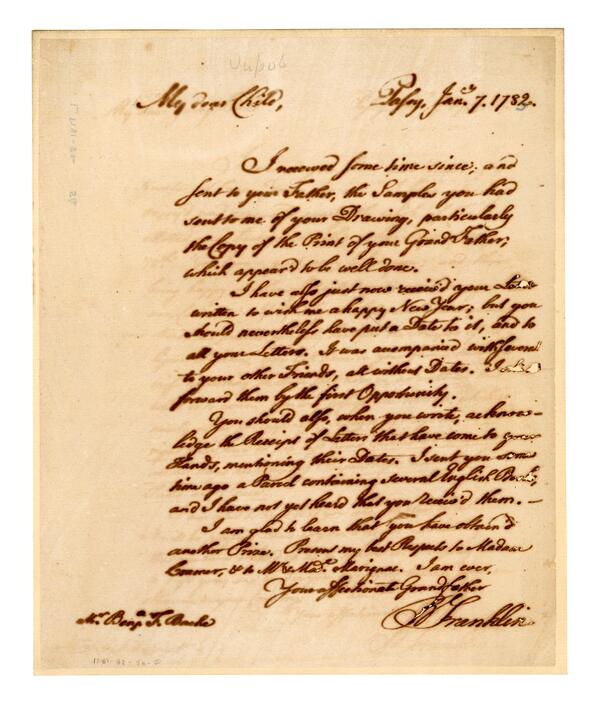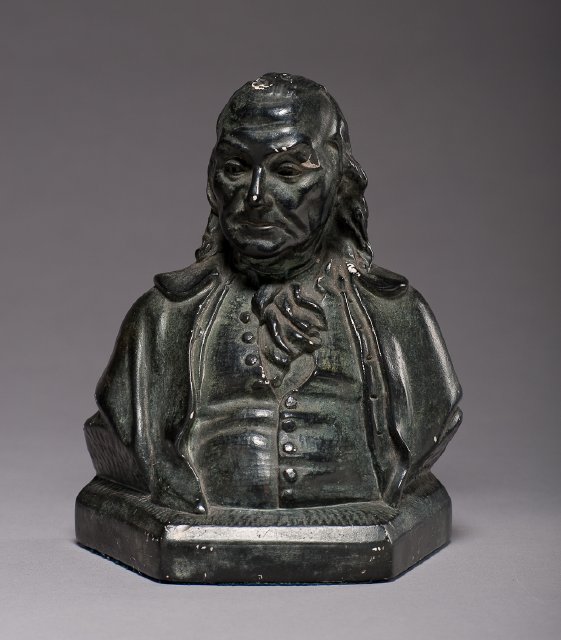Revolutionary PHL: But you should […] have put a date to it
“I have also just now receiv’d your Letter written to wish me a happy New Year; but you should nevertheless have put a Date to it, and to all your Letters. It was accompanied with Several to your other Friends, all without Dates. I [will] forward them by the first Opportunity.
You should also, when you write, acknowledge by Receipt of Letters that have come to your Hands, mentioning their Dates. I sent you some time ago a Parcel containing several English Books and I have not yet heard that you receiv’d them.”
Benjamin Franklin wrote this letter to his grandson, Benjamin Franklin Bache, in 1782. The letter is part of the Franklin-Bache collection housed at the American Philosophical Society, which is now digitized and available on The Revolutionary City: A Portal to the Nation's Founding. Franklin’s scolding tone, like a relative who is correcting behavior, may seem familiar. However, in the 18th century, the epistolary conventions Franklin was teaching his 12-year-old grandson were essential in effective communication and far from trivial.

When reading through the letters on the Revolutionary City portal, you may wonder or become tired of the first paragraph (or two!) amounting to descriptions of when the writer received the last letter and when they had sent letters. But, dating and being specific about letters one had received was essential, as it situated the recipient in what knowledge they may or may not have. If, for example, the letter writer stated that they had written the month prior on a certain date and you had not received it, then you were aware of potential missing information. Letters not reaching the intended recipient was not uncommon, as post riders and ships went missing or were captured. Even during times of peace, letters often did not find their way, or were significantly delayed due to a host of issues such as the weather (See Franklin Ledgers Project for more about mail in early America). Providing a date and information about what letters you were responding to and what letters you had sent before was, therefore, crucial. Franklin, who had been the postmaster of Philadelphia, would have been particularly attuned to the importance of writing proper opening formulas in letters. Consequently, the two paragraphs in which Franklin describes the etiquette of letter writing to his grandson are important lessons that Franklin Bache would need throughout his entire life.

In the 21st century, we no longer require these conventions. Texts and emails situate the knowledge automatically (for the most part) and the postal service is, basically, reliable. To a certain extent, we take for granted the metadata that recipients of our emails, texts, and letters access without our effort. Yet, the epistolary systems of prior centuries are not superfluous to modern scholars and other interested parties. Situating the intended recipient of the letter also situates contemporary readers in time and place. Beyond temporal orientation, as opening lines are often rote, it can allow access to difficult handwriting. As we digitize materials on the Revolutionary City project, these opening lines are essential to assess the letter’s relevancy and decipher the handwriting. Consequently, I am always frustrated by the few letters that are not dated, some of which are so rich in their content that the absence of the epistolary convention is particularly saddening. Consequently, even though I cannot change the writing style of an 18th-century Philadelphian, whenever I come across an undated letter I think of the grousing Franklin and say to myself, “but you should [...] have put a date to it.”


